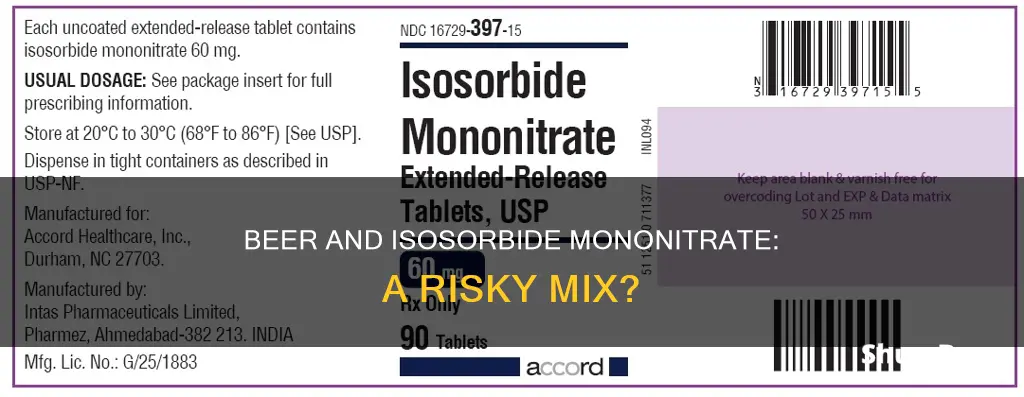
Isosorbide mononitrate is a medication used to treat chest pain (angina) caused by coronary artery disease. It works by relaxing and widening the blood vessels, improving blood flow and oxygen supply to the heart. While it is effective in preventing angina attacks, it is not suitable for treating sudden chest pain. When considering the consumption of alcohol with this medication, caution is advised due to the potential for interactions. Mixing isosorbide mononitrate with alcohol can lead to an enhanced drop in blood pressure, causing symptoms such as dizziness, lightheadedness, and fainting. The combined effect of both substances on vasodilation can further increase the risk of low blood pressure and related adverse effects. Therefore, it is generally recommended to avoid consuming alcohol while taking isosorbide mononitrate to minimize any potential risks.
| Characteristics | Values |
|---|---|
| Can I drink beer while on isosorbide mononitrate? | Not recommended |
| Reason | May cause additive effects in lowering blood pressure |
| Side effects | Headache, dizziness, lightheadedness, fainting, and/or changes in pulse or heart rate |
What You'll Learn
- Isosorbide mononitrate and alcohol can cause additive effects in lowering blood pressure
- Combining the two can increase side effects such as headaches, dizziness, and fainting
- Alcohol consumption is not recommended while taking isosorbide mononitrate
- The combination can cause a dangerous drop in blood pressure, increasing the risk of falls
- It is important to consult a doctor before consuming alcohol while taking this medication

Isosorbide mononitrate and alcohol can cause additive effects in lowering blood pressure
Isosorbide mononitrate is a medication used to treat chest pain (angina) caused by coronary artery disease. It belongs to a class of drugs called nitrate vasodilators, which work by relaxing and widening the blood vessels, thereby improving blood flow and reducing the workload on the heart. This medication is available by prescription only and is typically taken orally in the form of tablets or extended-release capsules.
Alcohol, on the other hand, is a central nervous system depressant that can affect various parts of the body, both in the short and long term. When consumed, alcohol is rapidly absorbed into the bloodstream and can interact with neurotransmitters in the brain, affecting mood, cognition, and coordination. While alcohol consumption is widespread, it can have detrimental effects on the body, especially when mixed with certain medications.
When it comes to mixing isosorbide mononitrate and alcohol, caution is strongly advised due to the potential for additive effects in lowering blood pressure. Both substances contribute to vasodilation, causing blood vessels to relax and widen. If combined, this effect can be enhanced, leading to a more significant drop in blood pressure. This interaction can result in dangerous side effects such as lightheadedness, dizziness, fainting, changes in pulse or heart rate, and an increased risk of falls. These side effects are most likely to occur at the beginning of treatment, following a dose increase, or when treatment is restarted after an interruption.
Additionally, alcohol can accentuate the vasodilatory effects of isosorbide mononitrate, further increasing the risk of hypotension. As a result, individuals taking isosorbide mononitrate are generally advised to avoid consuming alcohol. The potential risks and interactions are believed to outweigh any potential benefits. However, in rare cases, a healthcare provider may deem it acceptable for a patient to consume alcohol while taking isosorbide mononitrate based on their specific circumstances and medical history.
If you are taking isosorbide mononitrate and wish to consume alcohol, it is crucial to consult your healthcare provider first. They can provide personalized advice and assess your individual situation to determine the safest course of action. Prioritizing your health and safety is of utmost importance, and abstaining from alcohol or seeking medical advice is generally recommended when taking this medication.
Beer and Dieting: Is It Possible to Have Both?
You may want to see also

Combining the two can increase side effects such as headaches, dizziness, and fainting
Combining isosorbide mononitrate and alcohol can increase the intensity of side effects such as headaches, dizziness, and fainting. This is because both substances contribute to vasodilation, which causes blood vessels to relax and widen, leading to a drop in blood pressure. The vasodilatory effects of isosorbide mononitrate can also cause a temporary decrease in blood flow to the brain, resulting in lightheadedness, dizziness, and fainting spells.
The consumption of alcohol while taking isosorbide mononitrate can accentuate these effects, increasing the risk of severe low blood pressure and related adverse events. This combination may also lead to an increased risk of falls and can cause changes in pulse or heart rate. These side effects are most likely to occur at the beginning of treatment, following a dose increase, or when treatment is restarted after an interruption.
It is important to note that the potential risks and interactions of combining isosorbide mononitrate and alcohol typically outweigh any potential benefits. Therefore, it is generally recommended to avoid consuming alcohol while taking this medication. However, if you wish to consume alcohol while taking isosorbide mononitrate, it is crucial to consult your healthcare provider first. They can provide personalized advice based on your medical history and current medications.
Minors and Non-Alcoholic Beer: Is It Safe?
You may want to see also

Alcohol consumption is not recommended while taking isosorbide mononitrate
Isosorbide mononitrate is a medication used to treat chest pain (angina) caused by coronary artery disease. It belongs to the group of medicines called nitrates, which work by relaxing and widening the blood vessels, thereby improving blood flow and oxygen supply to the heart.
Alcohol, on the other hand, is a central nervous system depressant that can have various effects on the body, both in the short and long term. When consumed, alcohol rapidly enters the bloodstream and affects the brain, interacting with neurotransmitters that regulate mood, cognition, and coordination.
When it comes to combining isosorbide mononitrate and alcohol, caution is strongly advised due to potential interactions and risks. Both substances can contribute to vasodilation, causing blood vessels to relax and widen. This combined effect can lead to a significant drop in blood pressure, resulting in symptoms such as lightheadedness, dizziness, fainting, and an increased risk of falls. The impact may be more pronounced at the beginning of treatment, after a dose increase, or when treatment is restarted after an interruption.
Additionally, alcohol consumption can increase the side effects of isosorbide mononitrate, including headaches, flushing, and rapid heartbeats. It is important to note that these side effects may be more common during the initial stages of treatment but often diminish over time as the body adjusts to the medication.
For these reasons, it is generally recommended to avoid consuming alcohol while taking isosorbide mononitrate. The potential risks and interactions are considered to outweigh any benefits. If you are taking isosorbide mononitrate, it is crucial to prioritize your health by abstaining from alcohol or seeking advice from your healthcare provider. They can provide personalized guidance based on your specific circumstances and medical history.
Drinking Beer on Rhode Island's Beaches: What's Allowed?
You may want to see also

The combination can cause a dangerous drop in blood pressure, increasing the risk of falls
Combining isosorbide mononitrate and alcohol can be dangerous, leading to a significant drop in blood pressure. This drop in blood pressure can cause a range of adverse symptoms, including lightheadedness, dizziness, and an increased risk of falls.
Isosorbide mononitrate is a medication commonly prescribed to prevent chest pain (angina) caused by coronary artery disease. It belongs to a class of drugs called nitrate vasodilators, which work by relaxing and widening the blood vessels. This action reduces the workload on the heart, improves blood flow, and increases the supply of oxygen to the heart, thereby helping to prevent angina attacks.
On the other hand, alcohol is a central nervous system depressant that can affect various parts of the body in both the short and long term. When consumed, alcohol is rapidly absorbed into the bloodstream and can interact with neurotransmitters in the brain, affecting mood, cognition, and coordination.
When combined, isosorbide mononitrate and alcohol can have additive effects on lowering blood pressure. This is because both substances contribute to vasodilation, or the relaxation and widening of blood vessels. The combined effect can be more pronounced, leading to a more substantial drop in blood pressure. This drop in blood pressure can cause lightheadedness, dizziness, and an increased risk of falls, which may be severe enough to require medical attention.
Additionally, the vasodilatory effects of both substances can be accentuated, further increasing the risk of low blood pressure and related complications. It is important to note that these side effects are more likely to occur at the beginning of treatment, following a dose increase, or when treatment is restarted after an interruption.
The exact mechanisms underlying the interaction between isosorbide mononitrate and alcohol are not yet fully understood. However, the general medical consensus is that it is best to avoid consuming alcohol while taking isosorbide mononitrate. The potential risks and interactions, particularly the risk of low blood pressure and related adverse effects, are considered to outweigh any potential benefits.
If you are taking isosorbide mononitrate and wish to consume alcohol, it is essential to consult your healthcare provider first. They can provide personalized advice based on your specific medical history and current medications. Prioritizing your health and safety by abstaining from alcohol or seeking medical advice is crucial when taking this medication.
Beer and Breastfeeding: Is It Safe to Drink Alcohol?
You may want to see also

It is important to consult a doctor before consuming alcohol while taking this medication
Isosorbide mononitrate is a medication used to prevent chest pain (angina) caused by coronary artery disease. It works by relaxing and widening the blood vessels, which improves blood flow and oxygen supply to the heart. This medication is typically available by prescription only and belongs to the group of medicines called nitrates.
When considering whether you can drink alcohol while taking isosorbide mononitrate, it is important to consult a doctor beforehand. This is because consuming alcohol while on this medication can lead to increased side effects. Both isosorbide mononitrate and alcohol can cause a drop in blood pressure, and combining them may accentuate this effect. This can lead to symptoms such as lightheadedness, dizziness, fainting, changes in pulse or heart rate, and an increased risk of falls. These side effects are most likely to occur at the beginning of treatment, following a dose increase, or when treatment is restarted after an interruption.
Additionally, alcohol can make the dizziness caused by isosorbide mononitrate worse, as well as increase flushing and rapid heartbeats. It is important to be cautious when getting up from a sitting or lying position, as both the medication and alcohol can contribute to dizziness and fainting. The combination may also affect your ability to drive or operate machinery safely.
The exact mechanisms of the interaction between isosorbide mononitrate and alcohol are not fully understood. However, it is believed that both substances contribute to vasodilation, the relaxing and widening of blood vessels, which can lead to a more pronounced drop in blood pressure when combined.
While most medical professionals advise against mixing isosorbide mononitrate and alcohol, there may be individual cases where a doctor deems it acceptable based on a patient's specific circumstances and medical history. Therefore, consulting a healthcare provider before consuming alcohol while on this medication is crucial. They can provide personalized advice and help you weigh the risks and benefits based on your unique situation.
Beer and Acne: Is There a Connection?
You may want to see also
Frequently asked questions
It is not recommended to consume alcohol while taking isosorbide mononitrate. The combination of the medication and alcohol can lead to a dangerous drop in blood pressure, causing symptoms such as dizziness, fainting, and an increased risk of falls.
The side effects of mixing isosorbide mononitrate and alcohol include lightheadedness, fainting, changes in pulse or heart rate, headache, and low blood pressure. These side effects can be more pronounced during the initial stages of treatment or after a dose increase.
Isosorbide mononitrate and alcohol both have vasodilatory effects, causing blood vessels to relax and widen. When taken together, this combined effect can lead to a more significant drop in blood pressure.
If you experience side effects such as lightheadedness, fainting, or a severe drop in blood pressure after consuming alcohol while on isosorbide mononitrate, seek immediate medical attention. These symptoms may indicate a potentially dangerous interaction between the two substances.
It is generally advised to abstain from alcohol consumption while taking isosorbide mononitrate to minimize any potential risks. If you wish to consume alcohol, consult your healthcare provider first for personalized advice based on your medical history and current medications.







